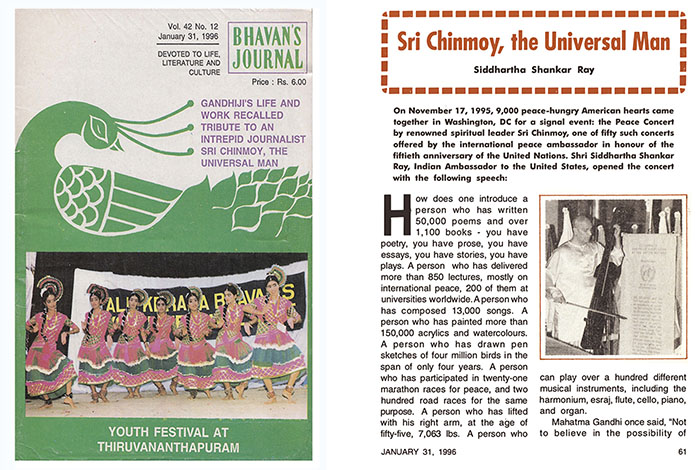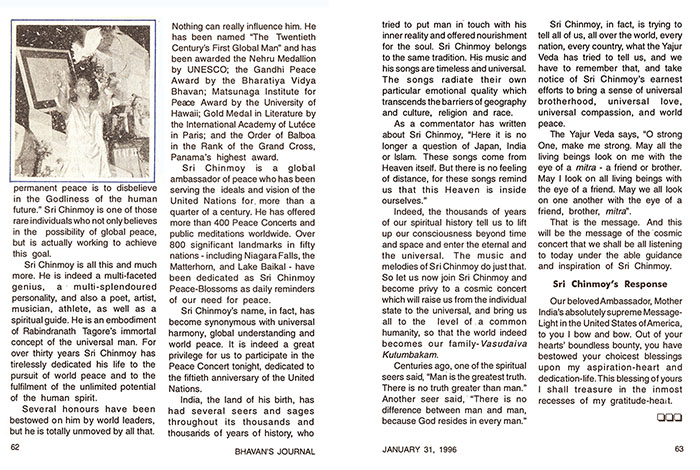Sri Chinmoy, the Universal Man
Siddhartha Shankar Ray
On November 17, 1995, 9,000 peace-hungry American hearts came together in Washington, DC, for a signal event: the Peace Concert by renowned spiritual leader Sri Chinmoy, one of fifty such concerts offered by the international peace ambassador in honour of the fiftieth anniversary of the United Nations. Shri Siddhartha Shankar Ray, Indian Ambassador to the United States, opened the concert with the following speech:
How does one introduce a person who has written 50,000 poems and over 1,100 books — you have poetry, you have prose, you have essays, you have stories, you have plays. A person who has delivered more than 850 lectures, mostly on international peace, 200 of them at universities worldwide. A person who has composed 13,000 songs. A person who has painted more than 150,000 acrylics and watercolours. A person who has drawn pen sketches of four million birds in the span of only four years. A person who has participated in twenty-one marathon races for peace, and two hundred road races for the same purpose. A person who has lifted with his right arm, at the age of fifty-five, 7,063 lbs. A person who can play over a hundred different musical instruments, including the harmonium, esraj, flute, cello, piano, and organ.
Mahatma Gandhi once said, “Not to believe in the possibility of permanent peace is to disbelieve in the Godliness of the human future.” Sri Chinmoy is one of those rare individuals who not only believes in the possibility of global peace, but is actually working to achieve this goal.
Sri Chinmoy is all this and much more. He is indeed a multi-faceted genius, a· multi-splendoured personality, and also a poet, artist, musician, athlete, as well as a spiritual guide. He is an embodiment of Rabindranath Tagore’s immortal concept of the universal man. For over thirty years Sri Chinmoy has tirelessly dedicated his life to the pursuit of world peace and to the fulfilment of the unlimited potential of the human spirit.
Several honours have been bestowed on him by world leaders, but he is totally unmoved by all that. Nothing can really influence him. He has been named “The Twentieth Century’s First Global Man” and has been awarded the Nehru Medallion by UNESCO; the Gandhi Peace Award by the Bharatiya Vidya Bhavan; Matsunaga Institute for Peace Award by the University of Hawaii; Gold Medal in Literature by the International Academy of Lutece in Paris; and the Order of Balboa in the Rank of the Grand Cross, Panama’s highest award.
Sri Chinmoy is a global ambassador of peace who has been serving the ideals and vision of the United Nations for more than a quarter of a century. He has offered more than 400 Peace Concerts and public meditations worldwide. Over 800 significant landmarks in fifty nations — including Niagara Falls, the Matterhorn, and Lake Baikal — have been dedicated as Sri Chinmoy Peace-Blossoms as daily reminders of our need for peace.
Sri Chinmoy’s name, in fact, has become synonymous with universal harmony, global understanding and world peace. It is indeed a great privilege for us to participate in the Peace Concert tonight, dedicated to the fiftieth anniversary of the United Nations.
India, the land of his birth, has had several seers and sages throughout its thousands and thousands of years of history, who tried to put man in touch with his inner reality and offered nourishment for the soul. Sri Chinmoy belongs to the same tradition. His music and his songs are timeless and universal. The songs radiate their own particular emotional quality which transcends the barriers of geography and culture, religion and race.
As a commentator has written about Sri Chinmoy, “Here it is no longer a question of Japan, India or Islam. These songs come from Heaven itself. But there is no feeling of distance, for these songs remind us that this Heaven is inside ourselves.”
Indeed, the thousands of years of our spiritual history tell us to lift up our consciousness beyond time and space and enter the eternal and the universal. The music and melodies of Sri Chinmoy do just that. So let us now join Sri Chinmoy and become privy to a cosmic concert which will raise us from the individual state to the universal, and bring us all to the level of a common humanity, so that the world indeed becomes our family — Vasudaiva Kutumbakam.
Centuries ago, one of the spiritual seers said, “Man is the greatest truth. There is no truth greater than man.” Another seer said, “There is no difference between man and man, because God resides in every man.” Sri Chinmoy, in fact, is trying to tell all of us, all over the world, every nation, every country, what the Yajur Veda has tried to tell us, and we have to remember that, and take notice of Sri Chinmoy’s earnest efforts to bring a sense of universal brotherhood, universal love, universal compassion, and world peace.
The Yajur Veda says, “O strong One, make me strong. May all the living beings look on me with the eye of a mitra — a friend or brother. May I look on all living beings with the eye of a friend. May we all look on one another with the eye of a friend, brother, mitra.”
That is the message. And this will be the message of the cosmic concert that we shall be all listening to today under the able guidance and inspiration of Sri Chinmoy.
Sri Chinmoy’s Response
Our beloved Ambassador, Mother India's absolutely supreme Message-Light in the United States of America, to you I bow and bow. Out of your heart’s boundless bounty, you have bestowed your choicest blessings upon my aspiration-heart and dedication-life. This blessing of yours I shall treasure in the inmost recesses of my gratitude-heart.
Published in BHAVAN’S JOURNAL, Vol. 42 No. 21, Pages 61-63, January 31, 1996
Bob Dylan recites Sri Chinmoy’s poem ‘The Lock and the Key’ on the weekly one-hour satellite radio show, Theme Time Radio Hour, which he hosts in the USA.
The Lock and the Key
Doubt is the lock,
Faith is the key.
Hate is the lock,
Love is the key.
Body is the lock,
Soul is the key.
Ignorance is the lock,
Light is the key.
God’s Heart has no lock,
Man’s mind has no key.
Published in The Dance of Life, part 2


